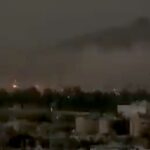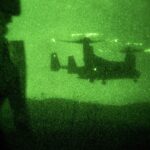Amid Ankara’s continued hydrocarbon exploration in the Eastern Mediterranean, the Turkish Republic of Northern Cyprus (TRNC) will allow the Turkish Air Force (TAF) to fly unmanned aerial vehicles (UAVs) from Gecitkale airport, Turkish Cypriot officials announced on Friday.
Geckitale Airport was opened in 1986 and is located 25 km inland from the TRNC capital and coast city of Famagusta/ Gazimagusa. Turkey developed Geckitale Airport as both an alternative to the TRNC’s main airport (Ercan) and as major, NATO-standardized air base. While Geckitale served only briefly as a commercial airport, it saw intense military activity. During the renewed tensions with Greece in the 1990s, Turkey forward-deployed F-16s to Geckitale. Following privatisation in 2012, Geckitale is only opened to VIP, charter and military flights.
AN ENERGY SECURITY DISPUTE
The move to open Geckitale to Turkish UAVs comes at a time of rising tensions between Turkey, on the side, and Greece, Cyprus, Israel and Egypt, on the other, over the demarcation of exclusive economic zones (EEZs) in the Eastern Medtierranean. Over recent years, Greece, Cyprus and Israel have discovered offshore gas fields in their EEZs. The trio, supported by the United States, signed an intergovernmental agreement to pursue a common pipeline project, in March 2019. Known as the “EastMed,” the project envisions an undersea pipeline that would deliver Israeli and Cypriote natural gas to the European Union via Greece. The European Commission has designated the EastMed pipeline as a “Project of Interest.”
Turkey, who hasn’t found any hydrocarbons in indisputably Turkish waters, sees the EastMed project as a threat to its status as an energy transit country and to the TRNC’s maritime rights. Turkey is the only member of the United Nations that does not recognize Cyprus, and is not a signatory of the U.N. Convention on the Law of the Sea. As a result, the Turkish view on maritime disputes is that no island, including Cyprus, can have a full EEZ. Ankara therefore either claims parts of the Cypriote offshore hydrocarbons or demands that the internationally-recognized Government in Nicosia shares its exclusive resources with the TRNC.
Turkish efforts to contest and redraw the map of the Eastern Mediterranean are far more advanced. On November 28, Ankara signed an agreement with Libya’s Government of National Accord (GNA), outlining their maritime boundaries. In accordance to the Turkish view on maritime boundaries, the agreement deprives the Greek islands of Kastellorizo, Karpathos, Kasos and Crete of an EEZ. This surged tensions with Greece but also with Israel and Egypt, which are spearheading a diplomatic offensive against Ankara. Turkey’s President Recep Tayyip Erdogan said the agreement would also allow Turkey to carry out drilling on Libya’s continental shelf with Tripoli’s approval.
UNILATERAL TURKISH DRILLINGS TO SPARK MILITARY TENSIONS
The Turkish Government ignored international criticism and authorized Turkish Petroleum to conduct drillings off Cyprus’ east and west coasts. Two Turkish drilling vessels – “Fatih” and “Yavus” – alongside “Oruc Reis” and “Barbaros Hayrettin Pasa” seismic vessels have been searching for oil and gas in the past five months. UAVs deployed from Dalaman Airport in southwestern Turkey have previously provided overwatch for the surface group. Turkish Navy and Coast Guard vessels – including Barbados- and G-class frigates – have also escorted Fatih and Yavus throughout their explorations.
#Turkey continues to seek #energy in the EEZ territory of Cyprus. A second drill ship, the “#Yavuz“, was observed, this time on the other side relative to the first ship, the “#Fatih“. Both ships aren’t close to the search blocks officially launched by #Cyprus #government. pic.twitter.com/vLq5DWFH1L
— ImageSat Intl. (@ImageSatIntl) July 23, 2019
The Turkish Navy intercepted “Bat Galim”, an Israeli research ship belonging to the Oceanographic and Limnological Research Institute, in Cypriote waters two weeks ago. The Bat Galim was conducting research in coordination with the Cypriote government when the Turkish warships forced it to leave. In response, the Israeli Air Force and Navy staged a major military exercise in the Eastern Mediterranean involving F-15I “Ra’am”, F-16I “Sufa” and F-35I “Adir” fighter jets, two days ago.
#BREAKING: #Israel Navy & Air Force will hold a military exercise in Eastern #MediterraneanSea tomorrow btw 0900 & 1400Z. This is a firm response to illegal actions of #Turkish Navy in #MediterraneanSea which includes deporting Bat-Galim research ship out of #Cyprus 2 weeks ago. pic.twitter.com/hXeYeFuwII
— Babak Taghvaee (@BabakTaghvaee) December 14, 2019
GECIKTALE AIRPORT: FASTER ISR DEPLOYMENTS, LONGER LOITER TIME
Tensions are expected to rise as Turkey will enforce its maritime claims and safeguard its commercial drilling operations, while Israel, Greece and Egypt will attempt to contest the Turkish and Libyan (GNA) objectives. With the permission to use Geciktale in effect, the Turkish UAVs – likely Bayraktar 2-TB – will have a shorter flight-path to its objective and enjoy a longer loiter time. This translates into increased situational awareness over the drilling operations and better response time to Greek or Israeli actions.
- Russia Bombs Maternity Ward & Children’s Hospital in Mariupol As Part of Siege - 10 March 2022
- T-Intell’s OSINT Training Marks One Year Anniversary - 18 November 2021
- IS-K Never Left the Battlefield - 27 August 2021





